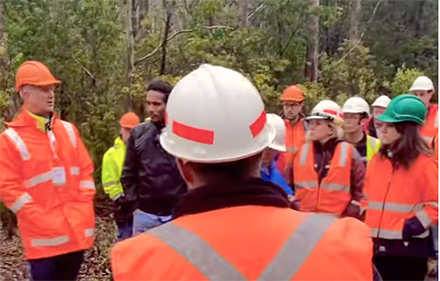Important work is going on in Australia’s historic and unique Tasmanian forest environment, which is seen as a positive and productive step towards forest renewal and regeneration. It involves the more frequent use of alternative harvesting methods, suited to forest type and eucalyptus species, and at the same time provides an enhanced understanding of the nature of these old forests. Source: Timberbiz
In a new innovative partnership, Responsible Wood-certified Sustainable Timber Tasmania and Midway Tasmania, one of Australia’s largest high quality wood fibre processors and exporters, are working to bring technically advanced, smart forest thinning operations to Tasmanian forests, which were previously subject to clear-cut silviculture in the 1970s and 1980s.
Endorsed by PEFC internationally, Responsible Wood is the Australian Standard for Sustainable Forest Management, with Responsible Wood forest certification demonstrating that forests meet social and environmental benchmarks.
Native Eucalyptus delegatensis forests, known for their gum top and stringy bark, are native to Tasmania’s east-coast.
Commonly known as alpine ash, gum-topped stringybark and white-top, E. delegatensis has a long history of forest management and have proven highly adaptable to several silvicultural treatments, including selective harvesting and single tree selection.
Today Tasmania’s forests are highly regulated, and through the introduction of the Forest Practices Authority and the Forest Practices Act (1985), forest managers are now required to match forest type and age with an appropriate silvicultural system.
Located in the Cluan Tiers, an area of intensive forestry, near the Eden Rivulet, forest managers are using selective harvest techniques to rejuvenate forests that were previously subject to clear-cut harvest operations in the 1970s.
Selective harvesting, otherwise known as selective thinning, is a natural forest process, where-by tree numbers are regulated to improve the health of remaining trees.
In addition, mature age-class trees are retained to preserve the forests eco-system. Overcrowd-ed trees are under competitive stress; thinning reduces stress and thereby increases the resistance of the stand to environmental stress, such as drought, insect infestation, extreme temperature and wildfire.
The practice of selective thinning, along with the installation of riparian corridors, preservation of habitat and retention of age-class trees are important elements of the Australian Standard for Sustainable Forest Management; used by native forests certified as part of the Responsible Wood certification scheme.
Responsible Wood is impressed with the results being achieved, as illustrated in this YouTube video: http://www.youtube.com/shorts/tulQxuJmNVc
Together, Midway Tasmania, Sustainable Timber Tasmania and forest contractor Orana Enter-prises, are conducting thinning operations in even-aged regrowth E. delegatensis forests, using advanced mechanised technology in an effective, efficient practice.
Michael Schofield, Midway Tasmania’s Resource Manager explains:
“This is an exciting and rewarding project to be involved with alongside Sustainable Timber Tasmania and Orana Enterprises. Sustainable Timber Tasmania provides excellent planning in-formation, and the forest contractor Orana Enterprise has made a large investment in equipment and trained people, and they approached the work in a positive, co-operative manner.”
The result is a forest canopy with minimal tree damage
“We are going back over the harvest and reforestation footprint from the 1970s and early 1980s, but this time using selective harvest to achieve a continuous canopy cover forestry,” Mr Schofield said.
In conjunction with selective harvest, steps will be taken to commence regeneration of the forest in and around the retained trees where natural regeneration hasn’t already occurred.
Due to the removal of select trees, the retained trees left in their native environment continue to grow. From this, trees have an increased likelihood of becoming high quality sawlog, given there are less trees to compete with for essential growing resources.
“Importantly, we have adopted the improvements in environmental care achieved via the Forest Practices Code. There is a real opportunity to not only maintain, but to enhance, the broad spectrum of forest values,” Mr Schofield said.
Long-term thinning will evolve the forests from even aged to multi aged. This process is building complexity and structure into the landscape.
This important work is a positive and productive step towards more frequent use of alternative harvesting methods suited to forest type and eucalyptus species, and at the same time providing an enhanced understanding of the unique Tasmanian forest environment.
For more information about Sustainable Timber Tasmania and Midway Limited and Sustainable Forest Management, please visit the Responsible Wood website.








